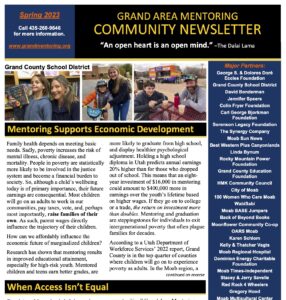Spring 2023 Community Newsletter
Mentoring Supports Economic Development
Family health depends on meeting basic needs. Sadly, poverty increases the risk of mental illness, chronic disease, and mortality. People in poverty are statistically more likely to be involved in the justice system and become a financial burden to society. So, although a child’s wellbeing today is of primary importance, their future earnings are consequential. Most children will go on as adults to work in our communities, pay taxes, vote, and, perhaps most importantly, raise families of their own. As such, parent wages directly influence the trajectory of their children.
How can we affordably influence the economic future of marginalized children?
Research has shown that mentoring results in improved educational attainment, especially for high-risk youth. Mentored children and teens earn better grades, are more likely to graduate from high school, and display healthier psychological adjustment. Holding a high school diploma in Utah predicts annual earnings 20% higher than for those who dropped out of school. This means that an eight-year investment of $16,000 in mentoring could amount to $400,000 more in earnings over the youth’s lifetime based on higher wages. If they go on to college or a trade, the return on investment more than doubles. Mentoring and graduation are steppingstones for individuals to exit intergenerational poverty that often plague families for decades.
According to a Utah Department of Workforce Services’ 2022 report, Grand County is in the top quarter of counties where children will go on to experience poverty as adults. In the Moab region, a startling 35.7% of youths may not escape the cycle. Compare this to the healthiest county, Morgan, at only 8%. This disparity is happening in counties separated by a mere 200 miles.
Furthermore, Grand County has the third highest teenage pregnancy rate out of 29 counties, and about 20% of students do not graduate from high school. Grand Area Mentoring also serves the children of northern San Juan County, which is one of the America’s most persistently poverty-stricken areas where 20% of the population has lived below the poverty line for the last 30 years.
The State of Utah, Grand County School District, and other agencies are working to combat these destructive forces. This is effort well spent because interventions can positively affect cultural norms, early childhood care, educational performance, and social cohesion.
Youth mentoring is one of the proven strategies that points children toward better outcomes. According to national data, mentored youth are 55% less likely to skip school, 130% more likely to hold leadership positions, and 46% less likely to start using illegal drugs. Over 92% of participating youth in Moab qualify for free or reduced lunch. Thus, Grand Area Mentoring is reaching the right population. Youth are recommended for the program by mental health counselors, teachers, and parents. School-based therapist Kelly Vagts observed that many of her clients talk about the importance of mentoring in their lives, and she has said to mentors, “You matter, you matter, you matter.”
The program estimates that Grand Area Mentoring is serving about 57% of students at highest risk of failure in the region. It provides mentors to children who may lack weekly interaction with wise, experienced adults. Moab’s mentors are role models, advisors, advocates, and resources. 100% of mentored youth report being happier. Furthermore, the relationships are not temporary. In fact, they last more than 400% longer in Moab than those documented in a national Department of Education study.
Mentors guide youth away from school drop-out, pregnancy, drug use, and illegal behavior. The cost of $2,000 per child is paltry when compared with the alternative – youth floundering in unhappiness that almost always leads to bad outcomes for all.
Youth mentoring is a case where our ethical duties and our economic choices coincide.

[button url=”https://grandmentoring.org/wp-content/uploads/Community-Newsletter-Spring-2023-V2.pdf” target=”_blank” style=”red” size=”medium” type=”square”]View Newsletter [/button]
